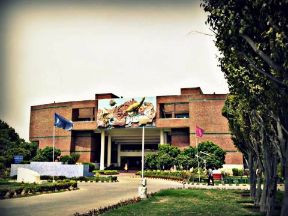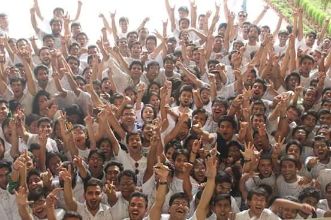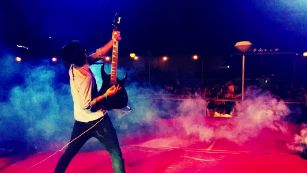| VLSI Design Lab |
|
|
| Electronics Lab I/II |
Lab Name: Electronics (I/II) Lab
Purpose: The purpose of a Basic Electronics Engineering Lab is to provide hands-on experience in understanding electronic components, circuits, and measurement techniques. It fosters practical skills in designing, assembling, and troubleshooting circuits, bridging theoretical and experimental knowledge with real-world applications, and preparing students for advanced studies and professional challenges in electronics and related fields.
Equipment: The following instruments are available in this lab:
- Digital Storage Oscilloscope (DSO)
- Function Generator
- DC Power Supply
- Multimeter
Student Involvement: Students benefit from a basic electronics engineering lab in several ways, including:
Hands-On Training
- Practical Knowledge: Students gain direct experience in assembling and testing circuits, reinforcing theoretical concepts.
- Component Familiarity: Learn to identify and work with electronic components like resistors, capacitors, transistors, and ICs.
- Instrument Proficiency: Develop skills in using lab equipment such as multimeters, oscilloscopes, and power supplies.
Research Opportunities
- Project Development: Explore innovative solutions for real-world problems through guided projects.
- Experimentation: Test theoretical ideas and evaluate their practical feasibility in a controlled environment.
- Data Analysis: Conduct experiments and analyze results, fostering a research-oriented mindset.
Skill Development
- Problem-Solving: Troubleshoot circuits and resolve design issues, enhancing analytical thinking.
- Circuit Design: Learn to design, prototype, and optimize electronic circuits for various applications.
- Programming Basics: Combine hardware with microcontroller programming for embedded systems projects.
- Teamwork and Communication: Collaborate with peers on group projects, enhancing interpersonal skills.
By bridging the gap between theory and practice, this lab equips students with critical skills and experiences essential for academic and professional growth. |
|
| Multimedia Research Lab |
Location:Room No. 201, Block IV
General information about the lab
Multimedia Research Lab was developed under the RPS research scheme of AICTE in 2009-10 and continuously being upgraded for the fulfillment of all the requirements of project and research work in the area of multimedia processing, pattern recognition and machine learning. Various departmental lab courses of UG and PG such as image processing, speech processing, adaptive and statistical signal processing are also supported by this lab. The future aim of this lab is to enhance the facilities in the direction of biomedical applications related to signal processing.Facilities available: Audio Visual workbench, computerised speech lab, Video Audio and Image processing software, Speakers, microphones, cameras and other basic items such as desktop computers, projector, printer etc |
|
| Advanced Computation Laboratory |
Location:Room No. 125, Block IV
General information about the lab
This Lab was setup with the aim to create a general computing facility mainly for PG/Research students and faculty. The laboratory is open to all PG/Research students and faculty throughout the day. PG/Research students are encouraged to use the lab to perfect their computing skills whenever they have time to spare. |
|
| Communication and Signal Processing Research Laboratory |
Location:Room No. 125, Block IV
General information about the lab
This Lab was setup using a grant obtained from AICTE under the MOSROBS scheme. The Communication and Signal Processing Research Lab undertakes research in the are of wireless communication and signal processing techniques for communication. |
|
| Advanced Communication Laboratory |
Location: Room No. 214, Block-IV
General information about the lab
The Communication/Advanced Communication Labs cater to the laboratory courses related to the communication courses of all the divisions of NSIT. The Lab curriculum has been designed so that students are able to gain hands-on experience using modern testing equipment, technology and MATLAB software.
The objective of these lab. courses is to learn how to generate and process analog and digital communication signals using signal processing algorithms in Matlab and the trainers boards, which use a unique block diagram approach for building experiments.. Observe and interpret the impact of channel impairments such as noise, power limitation and finite bandwidth on different communication methods and signals.
Facilities available
- Analog and Digital storage Oscilloscopes
- Programmable function generators
- Spectrum analyser/ Logic Analyser
- Programmable RLC tester
- Programmable Curve Tracer
- White Noise test set
- Digital Transmission analyser
- Frequency and time interval analyser
- Computer simulation of experiments
- Elecomm. Trainer and modeling systems
- Digital Transmission analyzer
- MATLAB S/W
|
|
| VLSI Design Laboratory |
Location: Room No. 15, Block-IV
General information about the lab
VLSI Design Laboratory has been setup in order to facilitate PG students and research scholars (TRFs) to conduct cutting edge research in the field of analog and mixed-signal integrated circuit design, SoC design and emerging technologies in the VLSI domain. It is also intended to validate the simulation results of the proposed circuits and optimization techniques by establishing appropriate collaborations with the foundries very soon.
- High performance Analog CMOS integrated circuit design
- Digital CMOS integrated circuit design and CAD for VLSI design
- Integrated circuit design using memristors
Facilities available
The equipments and software available in the Advanced Electronics Laboratory & Electronics Research Laboratory are used on a sharing basis. It is intended to execute renewal of Cadence EDA tools, and purchase of Synopsys EDA software package along with device simulation software, Silvaco TCAD 3D, for rapid expansion of the laboratory in the immediate future.
|
|
| Advanced Electronics Laboratory & Electronics Research Laboratory |
Location: Room No. 16 & 18, Block-IV
General information about the lab
Advanced Electronics Laboratory & Electronics Research Laboratory have been setup specifically for UG/PG students and research scholars for conducting research in the domain of low power, low voltage and high performance design of integrated circuits and systems.
Facilities available
In Advanced Electronics Laboratory & Electronics Research Laboratory, various simulation software are available such as ORCAD Circuit Simulator, Software (RHEL, ESV4), EDA software Mentor Graphics (25 User), EDA software Tanner Tools PRO (5 User), HP Desktop PCs and laser Jet Printer, UPS (5 KVA) etc. |
|
| Electronics Laboratory (I, II) |
Location: Room No. 12A & 12B, Block-IV
General information about the lab
Electronics Laboratory (I, II) engages undergraduate students of 3rd and 4th semester of all divisions of NSIT. Students are encouraged to perform basic experiments related to diodes, transistors and op-amps which aids in understanding of the circuit behavior at component level. The experiments range from realization of clippers, clampers, voltage regulators as applications of diodes to implementation of amplifiers, filters and oscillators of various types using BJTs, MOSFETs and op-amps.
Facilities available
The lab is equipped with all the modern electronic testing, measuring and other equipments like TDS series Digital real time Oscilloscope (DSO), AFG 3000 series Digital Arbitrary Function Generators, Dual DC power supply, Digital Multimeters, UPS (10 KVA), Digital & Analog IC Tester and Bread Board etc. |
|
| Analog Integrated Circuits I/II Lab |
Location: Room No. 218, Block IV
General information about the lab
AIC Lab contains facilities to conduct experimental work related to Bipolar and MOS Analog Integrated Circuits. It has the infrastructure for carrying out UG and PG experiments in the areas of Linear Integrated Circuits and BiMOS AICs.
Facilities available
The facilities include: Digital Oscilloscopes, Digital Storage Oscilloscopes, Dual Trace Oscilloscope, Frequency Counter, Digital Multimeters, Function Generators, Arbitrary Programmable Function Generators, Linear IC Trainer, Triple Output DC Power Supply and a number of other standard testing equipments. |
|



